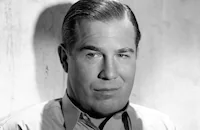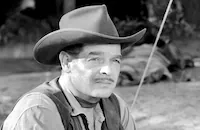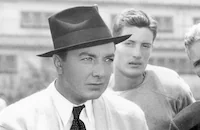Life Begins in College

Brief Synopsis
Cast & Crew
William A. Seiter
Ritz Brothers
Joan Davis
Tony Martin
Gloria Stuart
Fred Stone
Film Details
Technical Specs

Synopsis
Little Black Cloud, who calls himself "George Black," is the first Indian in recent times to enroll at Lombardy College, which was founded in 1847, according to a plaque, "to give the Indian nations of North America access to higher education." Upon George's arrival, football star Bob Hayner and his fraternity pals blindfold George and dress him in a nightgown, then encourage him to go into a women's physical science class and give a "war whoop." George obeys and the girls convulse in laughter. After Janet O'Hara, who owns the nightgown that the pranksters used, is drenched with a bucket of water meant for George, she berates Bob. Humiliated, George decides to leave, but he first takes his ripped trousers to the "Klassy Kampus Kleaners," which is run by the Ritz Brothers. Seeing that George carries a lot of money, the brothers convince him to stay in school. Meanwhile, Janet's father, Coach Tim O'Hara, is asked to resign because of his age by a committee of which Bob is a member. Bob, who is attracted to Janet, tells her that he has convinced the committee to change their minds, but at a dance, the dean announces her father's resignation, whereupon Janet slaps Bob. George, whom Janet has helped escape from Inez, a love-struck student, tells the Ritz Brothers that he would like to help the coach, but that he does not want to use his money, which he gets from oil wells in Oklahoma, because he wants people to like him for himself. The brothers offer to spend the money for him, and after purchasing massages, manicures, shoeshines, new clothes and cars, they give the college $50,000 on the condition that O'Hara be reinstated and that they be allowed to play on the football team. At practice, George tackles Bob, who makes a bigoted remark regarding him. George then runs back a punt for a touchdown and knocks Bob over. When Bob slugs George, O'Hara makes George the first-string quarterback. With George in command, Lombardy begins to win all their games by wide margins, despite the efforts of the Ritz Brothers, who invariably, though unintentionally, score points for the other side. At a victory bonfire before the big game with Midwestern, George, annoyed by Inez, tells her that in order to marry him, she must have a tattoo of a snake on her arm. Janet becomes convinced that Bob really did try to help, but she is dismayed when she sees him with his former girl friend Cuddles, who forces him to take her home by threatening to reveal that George used to play football in Oklahoma for an oil company team and therefore, because he was a professional, cannot play in college. On the train to Midwestern, Cuddles sees Bob with Janet and, using Bob's name, sends a wire to the Midwestern coach about George's past. When questioned, George admits playing for the oil team, but he says that he did it for fun and gave the money away. Nevertheless, he is deemed ineligible to play. The coach is about to kick Bob off the team for sending the wire, but Bob denies the charge and George says he believes him, so the coach relents. Bob makes an eighty-two-yard run to score a touchdown and then blocks extra point kicks, so that with five minutes remaining, the score is twelve to seven with Midwestern leading. After Bob collapses with a broken collarbone, the Ritz Brothers sneak onto the field and then proceed to commit penalties which drive their team back to their own six-yard line. Harry Ritz, however, catches his own pass and scores a touchdown just as the gun to end the game goes off. After Cuddles confesses, Janet kisses Bob, who is recovering. Inez shows George that she has the tattoo on her arm, but when George then ferociously kisses her, she tries to rub the tattoo off.

Director

William A. Seiter
Cast
Ritz Brothers

Joan Davis

Tony Martin

Gloria Stuart

Fred Stone

Nat Pendleton
Dick Baldwin

Joan Marsh
Jed Prouty
Maurice Cass
Ed Thorgersen

Marjorie Weaver

Robert Lowery

Lon Chaney Jr.
J. C. Nugent

Fred Kohler Jr.

Elisha Cook Jr.
Charles Wilson
Frank Sully
Norman Willis
Dixie Dunbar
Dick Klein
Ron Cooley
Jim Pierce
Jeff Cravath
Hal K. Dawson
Sarah Edwards
Robert Murphy
Spec O'donnell
Jan Duggan
Edmund Jones
Lester Wilkins
Ben Green
Roy Glenn
Martin Turner
Frank Melton
Edward Arnold Jr.
Thomas Kellard
Grant Peters
Ernie Alexander
William Moore
Crew
Nick Castle
Don Ettlinger
Ray Golden
Charles Hall
Roger Heman
Sid Kuller
Al Lewis
Thomas Little
Louis Loeffler
Murray Mencher
Sidney D. Mitchell
Hans Peters
Robert Planck
Samuel Pokrass
Lew Pollack
Royer
Geneva Sawyer
Louis Silvers
Jule Styne
Charles Tobias
Karl Tunberg
Arthur Von Kirbach
Harold Wilson
Darryl F. Zanuck

Videos
Movie Clip



Hosted Intro
Film Details
Technical Specs

Articles
Life Begins in College
The Ritz Brothers play themselves as seventh-year undergraduates working their way through college at a local tailor called "Klassy Kampus Kleaners." The brothers lack any sort of academic aspirations, instead focusing their collective energies on becoming football stars. The brothers befriend football player George "Little Black Cloud" Black (Nat Pendleton), a wealthy Native American student--the first and only Native American at the fictional Lombardy College-- who wants to drop-out of college after being the victim of a humiliating prank pulled by the football team's star player, Bob Hayner (Dick Baldwin, in his first feature-length role). While the brothers genuinely like George, they quickly realize he is their potential ticket onto the school's football team. After replacing Bob as the team's star quarterback, George is disqualified because he played semi-professional football which is in violation of collegiate rules. This plotline is a nod to All-American football star Jim Thorpe, an athlete of Native American descent who was stripped of his two Olympic gold medals in the decathlon and pentathlon because of a two-year stint on a minor league baseball team. After a series of implausible events that are requisite in the typical screwball comedy, the Ritz Brothers finally get their chance at gridiron glory, scoring touchdowns for the opposing team and unintentionally saving the day in the game's final moments, much to comedic effect. Rounding out the story is a romantic plotline between Bob and Janet (Gloria Stuart), and George and Inez (Joan Davis).
While they had appeared in a handful of films as specialty acts in the early-to-mid 1930s, including such films as Sing, Baby, Sing (1936), One in a Million (1936), On the Avenue (1937) and You Can't Have Everything (1937), it wasn't until a year after signing with Twentieth Century-Fox that the comedic trio earned top billing in Life Begins in College. Although the Ritz Brothers are often compared to the Marx Brothers, their comedic style was quite different. Rather than each one having distinctly different personalities like the more popular Marx Brothers, the three Ritz Brothers mimicked one another. Following the success of Life Begins in College, the Ritz Brothers starred in several more films, including a loan-out to producer Samuel Goldwyn in 1938 for The Goldwyn Follies and their most popular film, the musical version of The Three Musketeers (1939), starring Don Ameche and Binnie Barnes. But by the end of 1939, the Ritz Brothers left Fox after a contract dispute and signed with Universal Pictures, making a string of low-budget films for the studio, with their last feature-length film as a comedic trio Never a Dull Moment in 1943.
Iowa-born Nat Pendleton was a Columbia University graduate and star-athlete, later competing in the 1920 Summer Olympics in Belgium, where he won a silver medal in wrestling. By the 1920s, Pendleton eyed a career in Hollywood and made a successful go of it, securing a series of bit and supporting parts as brawny henchmen and lovable goons, in over one-hundred productions. His most recognizable performances are in a pair of Marx Brothers' films, Horse Feathers (1932) and At the Circus (1939), as well as the popular Thin Man and Dr. Kildare franchises for MGM.
Joan Davis was a popular comedienne, starring in a number of B-comedies for Twentieth Century-Fox, including Love and Hisses (1937), Sally, Irene and Mary (1938) and My Lucky Star (1938). Davis was also one of the top talents of radio throughout the 1940s, and from 1952-1955 she starred in the popular sitcom I Married Joan, co-starring Jim Backus, for which she is best remembered today.
Life Begins in College also features the original songs "Big Chief Swing It," "Our Team is on the Warpath," "Fair Lombardy" and "Why Talk About Love?" composed by Lew Pollack with lyrics by Sidney Mitchell, as well as "Sweet Varsity Sue," written by Charles Tobias, Al Lewis and Murray Mencher.
Director: William A. Seiter
Producer: Harry Wilson and Darryl F. Zanuck
Screenplay: Don Ettlinger and Karl Tunberg
Cinematography: Robert H. Planck
Editing: Louis R. Loeffler
Art Direction: Hans Peters
Music: Lew Pollack, Sidney D. Mitchell and Louis Silvers
Cast: The Ritz Brothers (Al, Harry and Jimmy Ritz playing themselves), Joan Davis (Inez), Tony Martin (band leader), Gloria Stuart (Janet O'Hara), Fred Stone (Coach Tim O'Hara), Nat Pendleton (George "Little Black Cloud" Black), Dick Baldwin (Bob Hayner), Lon Chaney Jr. (Gilks) and Elisha Cook Jr. (Ollie Stearns).
BW-80m
By Jill Blake

Life Begins in College
Quotes
Trivia
Notes
The working titles of this film were 1937 Pigskin Parade, Pigskin Parade of 1937 and Pigskin Parade of 1938. This was the Ritz Brothers' first starring picture and Dick Baldwin's first film. According to New York Times, Baldwin, whom they called "a Zeppo to the Ritz brothers," won the male lead opposite Simone Simon in Love and Hisses (see AFI Catalog of Feature Films, 1931-40; F3.2587) because of his success in this film. According to a Variety news item, George Marshall was originally scheduled to direct. Film Daily noted that Sid Kuller wrote material for the Ritz Brothers before they entered films. According to news items, Ed Thorgersen was the sports announcer for the "Fox Movietone News." George Murphy and Phyllis Brooks are listed as cast members in early Hollywood Reporter production charts, but it is unlikely that they were in the final film. According to Liberty and Hollywood Reporter production charts, the Brewster Twins were in the cast, but their participation in the final film has not been confirmed. Hollywood Reporter production charts list Barney McGill as cameraman, but his participation in the film has not been confirmed. According to Box Office and Daily Variety, the running time of the preview was 80 minutes. The character of "George Black" contains some similarities to the great American football player and athlete Jim Thorpe, who was predominantly of American Indian descent and who was deprived of his gold medals for winning the decathlon and pentathlon in the 1912 Olympics because he played 2 summers of minor league baseball in 1910 and 1911.















